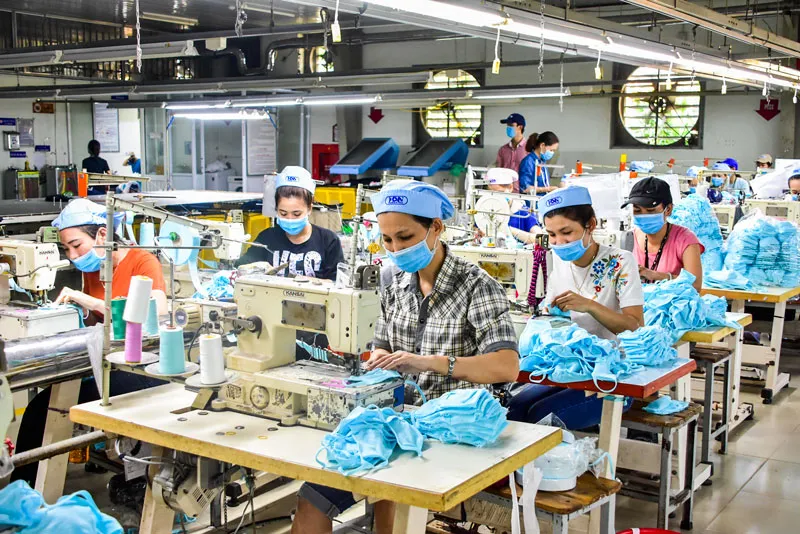
Production suspended
As every year, before the Tet Lunar New Year, the Minh Long Hung Garment Company prepares a substantial amount of goods to be released immediately after the Tet holiday season comes to an end. However, this year, because of the sudden spurt of the Covid-19 pandemic many things have been turned around. People have tightened spending, retail sales are low and hence the company had suspended further production and machines were shut, with workers asked to go on leave until March 2. Mr.
Ly Thanh Sinh, Director of the Minh Long Hung Garment Company, shared that workers had been temporarily laid off work but were still receiving 70% of their basic salary to take care of their needs, and the company was only continuing to run a small amount of production so they don’t fall short of stock completely.
In the current ongoing threat situation of the Covid-19 pandemic, making goods for the domestic market with a workforce of just around one hundred people is less difficult than making garments for exports with thousands of workers. Speaking with Saigon Investment, a representative of the Vietnam Textile and Apparel Association said that many businesses had run out of raw materials, had no pending orders, but were under great pressure to continue to pay the salaries and insurance money of workers. If enterprises fail to retain their workers, they will seek alternate work elsewhere. The leather and footwear industry is an example of a labor-intensive industry and is at present in a state of crisis.
Mr. Nguyen Tri Trung, Chairman of the Board of Directors of the Gia Dinh Shoes Company, said that the company was facing a difficult time due to lack of raw materials because it was not easy to find an alternative source for the materials either. Currently many businesses in the industry are starting to lay off workers. The Gia Dinh Shoes Company has workshops where workers can work on alternate days and in some workshops they have been asked to take ten days off from this coming Monday.
Even if workers have no work they still have to be paid a basic salary and as large enterprises have thousands of workers, this cost is huge. Businesses are now looking forward to state support. Mr. Trung gave the example of support for businesses in Cambodia, where enterprises only have to pay 60% of the basic salary of a worker in the present dire circumstances, of which the enterprise gives 40% and the state supports by 20%. Mr. Trung believes these are very practical supports and Vietnam should do the same as the Covid-19 pandemic has not only directly impacted the service industry but also the manufacturing as well and enterprises are feeling the strain.
Some enterprises in the high-tech park in Ho Chi Minh City have proposed to the Prime Minister and other ministries to remove difficulties in obtaining raw materials for production. The Datalogic Company that specializes in manufacturing export barcode scanners, said that currently production has not been able to return to normal as they have access to only 50% of raw materials. Mr. Dang Van Chung, factory manager at Datalogic, said the company was trying to hold onto workers to not quit their jobs. However, this is becoming difficult because input materials are running low and output products are faced with reduced orders, as many major trade fairs and exhibitions have been canceled or postponed.
Recovery expected after June
The current human resource situation across most businesses is quite gloomy, but some businesses are expecting a slight change for the better by the beginning of April. So far, China has well contained the spread of the Covid-19 pandemic and is determined to make a speedy recovery of its economy. Therefore, it is highly possible that the supply of raw materials for production will resume soon from China and exports will begin to go back to some normalcy by the second quarter. Only then will the Vietnamese factories start functioning again, and workers will be back to secure jobs, as income will gradually stabilize.
Even if input of goods sees some relief, the output of goods will be extremely slow due to huge pressure from more than a hundred countries around the world to meet all their orders. Workers in manufacturing units can only expect recovery by June, but services such as tourism, restaurants and hotels will continue to face volatility for much longer. Tourism is currently on hold and workers in this industry are unable to predict when they can return back to their jobs again.
The brutal impact of the Covid-19 pandemic has caused personnel losses to workers and a crisis in most business companies. Small and medium enterprises with small capital are feeling the impact much more, not to mention a number of companies that have to borrow and try to stay afloat. While enterprises are facing many difficulties, many employees are being laid off or have temporarily quit their jobs.
Directive 11/CT-TTg of Prime Minister Nguyen Xuan Phuc on urgent tasks and solutions to remove difficulties for production and businesses, ensures social security for coping with Covid-19 pandemic, considered by many businesses to be very timely.




















